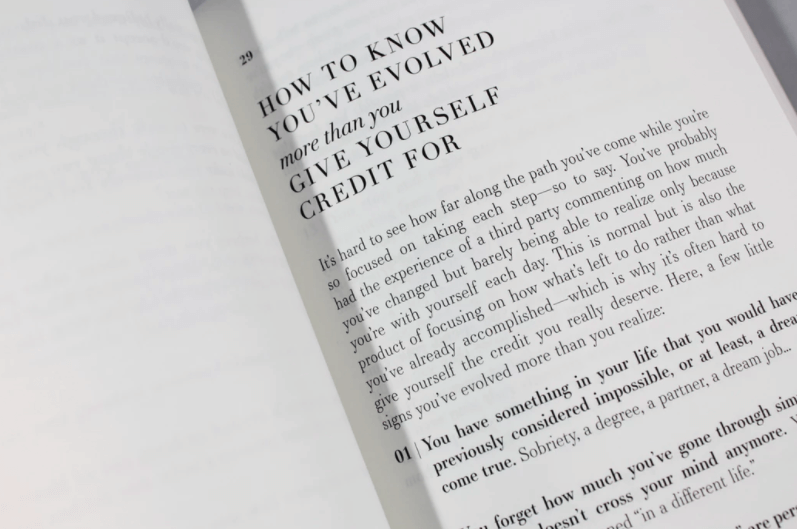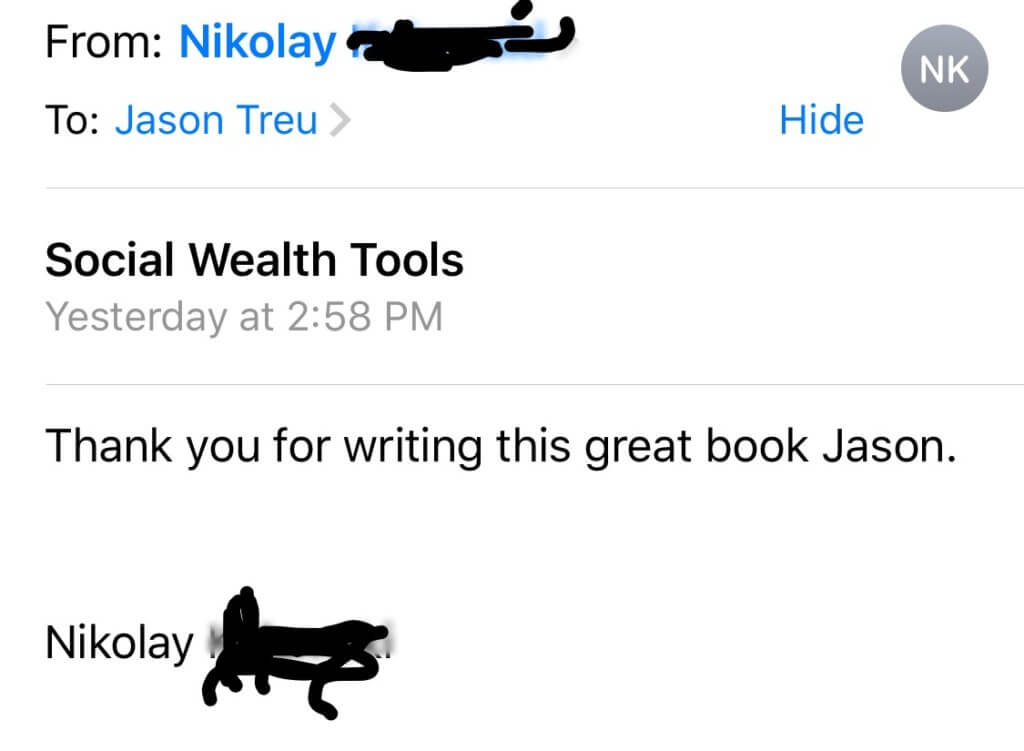by Jason Treu | Mar 21, 2018

Here is a question I got from a person from Amazon on my book Social Wealth.He is asking what other things he could do to have more business success (that includes building better business relationships) The key is self-awareness through pattern recognition. Let me explain why.
Your level of self-awareness is either equal to or greater than your social awareness.
That means if you have low self-awareness your ability to lead and manage others will be very poor. Well, studies find that only 10% of people are actually self-aware. I believe that number is actually high.
I’m sharing our (abridged) conversation below.
Here is the key takeaway (if you don’t time to read the conversation):
Rapid behavioral change comes down to pattern recognition – connecting the pattern with the payoff.
Once you see a pattern, you then can figure out the best course of action(s). And your more committed to taking action because you realize you are not “broken.” You are not a bad person. You’ve just done something for so long it’s apart of who you are.
It’s about connecting your past history with your current behavior. Often times what benefitted you in the past no longer serves you now.
For example, if you grew up in a household of six kids and had to talk over others to be heard, it’s no wonder you are a poor listener. Your payoff was talking over others got mommy and daddy to listen to me. You learned that not listening benefitted you. But now not listening is hurting your productivity and leadership of your team so you have to change.
Obviously, listening is a key component of building great relationships. But you’ve got to make that linkage to create the behavioral change.
Here in lies the big challenge: If your self-awareness is low, you will miss-read the external patterns consistently even though you will believe the opposite.
Experience doesn’t change our brain’s wiring near as fast or as much as understanding the patterns that sabotage our success.

Nikolay: Thanks for the link to the team building game. Are there other Social Wealth Tools, Processes or Mindsets I need to know about?
Me: This is a good article. The article is from Harvard Business Review’s Januar 2018 on self- a
nd social-social awareness.
“In 10 separate investigations with nearly 5,000 participants, we examined what self-awareness really is, why we need it, and how we can increase it.
Our research revealed many surprising roadblocks, myths, and truths about what self-awareness is and what it takes to improve it. We’ve found that even though most people believe they are self-aware, self-awareness is a truly rare quality: We estimate that only 10%–15% of the people we studied actually fit the criteria.”
The biggest challenge to building relationships, personally and professionally, is our own blind spots and patterns that sabotage our success. Cultivating your own self-awareness is the single best thing you can do.
Nikolay: Thanks for the great article Jason. So building social skills is not only understanding other people but also understanding yourself on a deeper level. That also means self-awareness is key.
(more…)
by Jason Treu | Mar 21, 2018
Here is a brief and reliable assessment / test to measure how empathetic you are: Toronto Empathy Questionaire.
“Empathy is an important component of social cognition that contributes to our ability to understand and respond adaptively to others’ emotions, succeed in emotional communication, and promote prosocial behavior.”
It’s a key leadership and management skill set to master.
Here is a sample set of the questions. Click here to take the test.
-
When someone else is feeling excited, I tend to get excited too
-
Other people’s misfortunes do not disturb me a great deal
-
It upsets me to see someone being treated disrespectfully
-
I remain unaffected when someone close to me is happy
-
I enjoy making other people feel better
-
I have tender, concerned feelings for people less fortunate than me
-
When a friend starts to talk about his\her problems, I try to steer the conversation towards something else
-
I can tell when others are sad even when they do not say anything
-
I find that I am “in tune” with other people’s moods
-
I do not feel sympathy for people who cause their own serious illnesses
How did you score?
by Jason Treu | Mar 18, 2018

Your brain is wired for survival, not to make you happy. It’s designed to question everything and be negative.
So negative self-talk is natural and we all do it because its purpose is to keep us safe from harm. But negative self-talk, left unchecked, can leave you feeling as though you aren’t enough, and exacerbate comparison and perfectionism. This can be crippling for your business and career success (and your personal life as well).
It may be subtle, but a negative core belief will have a serious impact on your success and fulfillment in business and life.
Awareness is the first and vital step.
Become aware that this self-talk is going on. Be aware, too, that you are constantly telling yourself something.
You are constantly creating the life you are living right now. You are constantly telling yourself a story. You are constantly thinking about your story. You may even be telling others your story when you complain to them about your life.
If you struggle with negative thoughts and self-sabotage, I recommend checking out The Dialectical Skills Behavior Workbook. It has excellent exercises and techniques to help get around mental challenges and roadblocks.
by Jason Treu | Mar 17, 2018

Most people don’t consciously spend time thinking of what they are grateful for and all the blessings in their lives, but gratitude is the gateway to happiness and abundance. It opens a window to positivity and wards off negativity, scarcity, and our fears.
Find a quiet area, close your eyes, take several deep breaths, and think about:
- A moment in your past that you are deeply grateful. Put yourself back in that moment and visualize it. How did you feel? What about that moment made you feel grateful and thankful? Was this a life-changing moment? What impact did it have on you at the time? Do you still feel the impact today? What would you say to the people who played a role in your grateful moment?
- Now do this with two additional moments.
I want you to do this exercise so you can feel gratefulness in your life and the impact it can have. Thinking about being grateful is one thing, but feeling it is much more powerful and empowering.
Gratefulness is one of those often-overlooked practices that we let go by the wayside because we’re always eager for more, and in the midst of our desires, we take a lot of things for granted. We’re always comparing ourselves to others and always seeking more of something, whether it’s money, fame, validation, or acceptance.
We overlook things that are already going great in our lives and focus on what’s not there. Whatever you focus on is what you will have.
There is nothing like a gratitude list to remind yourself of what’s great in your life already, and to build up your arsenal to combat negativity and scarcity. When you focus on being grateful, you focus on abundance.
Gratitude is also the key to happiness. There is an incredible amount of research dedicated to showing how powerful being grateful is and how it can impact your happiness. The Greater Good Science Center, based at UC Berkeley, is a leader in the field. I encourage you to check out their website.
In fact, the more grateful you are for things, the more you will find to be grateful for, instead of focusing on what’s missing.
This process starts with your grateful list.
Start with simple things:
- I am so grateful that I have a roof over my head.
- I’m so grateful that I have enough to eat.
- I am so grateful that I’m healthy.
- I’m so grateful that I have a job.
- I am so grateful that I have a car.
Focus on what is going great in your life, and try not to get caught up on what you don’t have.
Consider, too, what you may take for granted. A lot of people, for instance, don’t recognize what great health they’re in until they experience a health crisis. When they recover, their health means that much more to them. Include these aspects of your life in your gratitude list. This list is going to be different for everybody. Whatever it is for you, embrace that.
Do your gratitude practice out loud when you first wake up. It’s important to do this out loud. The mind-body connection you make when you declare something out loud makes this practice especially more effective. When I started saying my gratitude list out loud, and I could actually hear what I was grateful for, I got more excited about it and felt a powerful sense of positivity.
List new things every day so you can fully focus your attention, rather than just go through the motions with memorized items. List three things—more if you want to, but no fewer than three. The idea is to make this a daily practice and to stick with it.
Share your gratitude:
Think of two people in your life that you are really grateful for, who helped you with a specific challenge or who were there for you during a difficult time. Now email or write them a card telling them you’re grateful for them, then tell them, specifically, why. You may tell your friends and family you love them often— that’s great. Sharing with them how they’ve impacted your life, exactly what they did to support, motivate, guide, or help you, is even more powerful. It’s one thing to tell someone you love them; it’s another thing to tell them specifically why you love them and what they did for you that you truly appreciate. Try it, and you will see some amazing results!
Your Gratitude Jar:
Here is another way you can create more gratefulness in your life. Buy a jar, and every day write down what you are grateful for on one or two small slips of paper. Put them in the jar and watch the stack grow over time. In December, take out the pieces of paper and read all the amazing things you have been grateful for during the year. Start the process over every January 1st.
Start being more grateful in your life and you’ll see many new possibilities open up. You’ll start feeling more energetic and excited. You’ll start being more successful in every area of your life.
by Jason Treu | Mar 16, 2018

Do You Want to Be Right or Happy?
My dad only saw the world as black and white. He had to be right at all costs. He’d argue it was raining outside even if it was sunny, and try to get you to agree with him. He was stubborn and bullheaded.
That was his way. He alienated his family, friends, co-workers and boss.
Ultimately, he ended up being alone and dying alone.
He ended up being right, but he wasn’t happy.
Do you know anyone like that in your life? What’s the cost for them?
I share this message with almost every one of my clients because at some point they refuse to take into consideration that they may be wrong. They shut down and refuse to listen to other points of view.
Many leaders rather fight, argue and steamroll over people to get their way no matter the cost. They are so certain of their stance on an issue, they refuse to see the other side. Or even if they listen, they’ve already have made their mind up.
They alienate people in the process, and that type of leadership kills teamwork. You also hurt performance, retention, creativity, problem-solving and so much more.
When you lead with fear and a whip, do you think that brings out the best in people? Do you think they are more engaged? Do you think they will come to you with problems and suggested solutions?
The answer is obviously NO!
The skills you should use here is listening and empathy. Seek to understand the other person and the overall situation.
Why is the other person taking the position they are? What information do they have? What are they feeling? What’s their payoff or what are they trying to gain? Is there common ground to meet in the middle? If you have to push your agenda, how can you make the other person feel better about the situation?
These are some of the questions you should be asking yourself.
Because you’ll win the battle, but lose the war.
You’ll have a lot more stress, problems, and distractions that go along with it.
It’s a sure-fire recipe to lower your key metrics, get people to leave the organization and decrease engagement.
Seek to understand and listen first. You’ll see everything in your organization improve almost instantly.
So…do you want to be right or happy?






